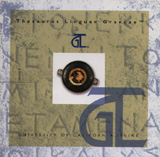The Thesaurus Linguae Graecae®: Our Mission and our Projects

The Thesaurus Linguae Graecae (TLG®) is a Special Research Program at the University of California, Irvine. Founded in 1972 the TLG® represents the first effort to produce a large digital corpus of literary texts. Since its inception the project has collected and digitized nearly texts written in Greek from Homer (8 c. B.C.) to the fall of Byzantium in A.D. 1453 and large number of post-Byzantine texts (16-20 c. A.D.). Its goal is to create a comprehensive digital library of Greek literature from antiquity to the present era. TLG research activities combine the traditional methodologies of philological and literary study with the most advanced features of information technology.
TLG® texts became available to the scholarly community first on magnetic tapes (in the mid 1970s) and later in CD ROM format. CD ROMs A (1985), C (1988) and D (1992) were produced with technical support from 'the Packard Humanities Institute (PHI). TLG® E (2000) was produced entirely in-house by the TLG team following the migration of the corpus from the Ibycus system to the Unix environment.
In spring 2001 the TLG-team developed its own search engine and made the corpus available online. Today the Online TLG contains more than 125 million words from over 12,000 works associated with 4,000 authors and is constantly updated and improved with new features and texts. The full corpus is available to more than 2,000 subscribing institutions and thousands of individuals in 79 countries worldwide. As of 2004, the project has been focusing its resources on web dissemination and is no longer licensing the corpus in CD ROM format.
A subcorpus (Abridged TLG®) together with the extensive bibliographical database developed by the TLG (Canon of Greek Authors and Works) is open to the public. The Abridged version contains more than 1,000 works from 145 authors and uses the same search engine as the full Online TLG version. It provides access to the most important classical authors and a large number of patristic texts.
As part of its efforts to lemmatize the Greek corpus, the TLG has digitized and made available a number of lexica, most notably the Liddell-Scott-Jones Greek-English lexicon, Cunliffe's Lexicon of Homeric Greek, Powell's Lexicon of Herodotus and more recently the Lexikon zur byzantinischen Gräzität (LBG) and more recently the Historical Lexicon of Modern Greek.
